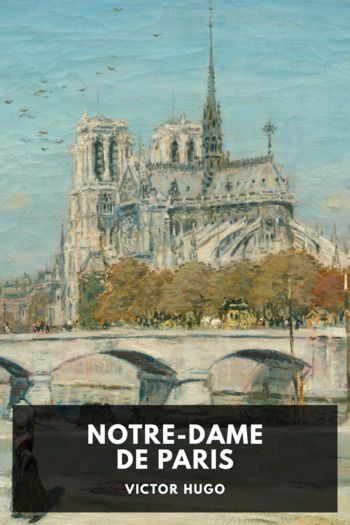Notre-Dame de Paris - Victor Hugo (diy ebook reader .txt) 📗

- Author: Victor Hugo
Book online «Notre-Dame de Paris - Victor Hugo (diy ebook reader .txt) 📗». Author Victor Hugo
Quasimodo beheld the outcasts scatter at the fall of the beam, like ashes at the breath of a child. He took advantage of their fright, and while they were fixing a superstitious glance on the club which had fallen from heaven, and while they were putting out the eyes of the stone saints on the front with a discharge of arrows and buckshot, Quasimodo was silently piling up plaster, stones, and rough blocks of stone, even the sacks of tools belonging to the masons, on the edge of the balustrade from which the beam had already been hurled.
Thus, as soon as they began to batter the grand door, the shower of rough blocks of stone began to fall, and it seemed to them that the church itself was being demolished over their heads.
Any one who could have beheld Quasimodo at that moment would have been frightened. Independently of the projectiles which he had piled upon the balustrade, he had collected a heap of stones on the platform itself. As fast as the blocks on the exterior edge were exhausted, he drew on the heap. Then he stooped and rose, stooped and rose again with incredible activity. His huge gnome’s head bent over the balustrade, then an enormous stone fell, then another, then another. From time to time, he followed a fine stone with his eye, and when it did good execution, he said, “Hum!”
Meanwhile, the beggars did not grow discouraged. The thick door on which they were venting their fury had already trembled more than twenty times beneath the weight of their oaken battering-ram, multiplied by the strength of a hundred men. The panels cracked, the carved work flew into splinters, the hinges, at every blow, leaped from their pins, the planks yawned, the wood crumbled to powder, ground between the iron sheathing. Fortunately for Quasimodo, there was more iron than wood.
Nevertheless, he felt that the great door was yielding. Although he did not hear it, every blow of the ram reverberated simultaneously in the vaults of the church and within it. From above he beheld the vagabonds, filled with triumph and rage, shaking their fists at the gloomy façade; and both on the gypsy’s account and his own he envied the wings of the owls which flitted away above his head in flocks.
His shower of stone blocks was not sufficient to repel the assailants.
At this moment of anguish, he noticed, a little lower down than the balustrade whence he was crushing the thieves, two long stone gutters which discharged immediately over the great door; the internal orifice of these gutters terminated on the pavement of the platform. An idea occurred to him; he ran in search of a fagot in his bellringer’s den, placed on this fagot a great many bundles of laths, and many rolls of lead, munitions which he had not employed so far, and having arranged this pile in front of the hole to the two gutters, he set it on fire with his lantern.
During this time, since the stones no longer fell, the outcasts ceased to gaze into the air. The bandits, panting like a pack of hounds who are forcing a boar into his lair, pressed tumultuously round the great door, all disfigured by the battering ram, but still standing. They were waiting with a quiver for the great blow which should split it open. They vied with each other in pressing as close as possible, in order to dash among the first, when it should open, into that opulent cathedral, a vast reservoir where the wealth of three centuries had been piled up. They reminded each other with roars of exultation and greedy lust, of the beautiful silver crosses, the fine copes of brocade, the beautiful tombs of silver gilt, the great magnificences of the choir, the dazzling festivals, the Christmasses sparkling with torches, the Easters sparkling with sunshine—all those splendid solemneties wherein chandeliers, ciboriums, tabernacles, and reliquaries, studded the altars with a crust of gold and diamonds. Certainly, at that fine moment, thieves and pseudo sufferers, doctors in stealing, and vagabonds, were thinking much less of delivering the gypsy than of pillaging Notre-Dame. We could even easily believe that for a goodly number among them la Esmeralda was only a pretext, if thieves needed pretexts.
All at once, at the moment when they were grouping themselves round the ram for a last effort, each one holding his breath and stiffening his muscles in order to communicate all his force to the decisive blow, a howl more frightful still than that which had burst forth and expired beneath the beam, rose among them. Those who did not cry out, those who were still alive, looked. Two streams of melted lead were falling from the summit of the edifice into the thickest of the rabble. That sea of men had just sunk down beneath the boiling metal, which had made, at the two points where it fell, two black and smoking holes in the crowd, such as hot water would make in snow. Dying men, half consumed and groaning with anguish, could be seen writhing there. Around these two principal streams there were drops of that horrible rain, which scattered over the assailants and entered their skulls like gimlets of fire. It





Comments (0)